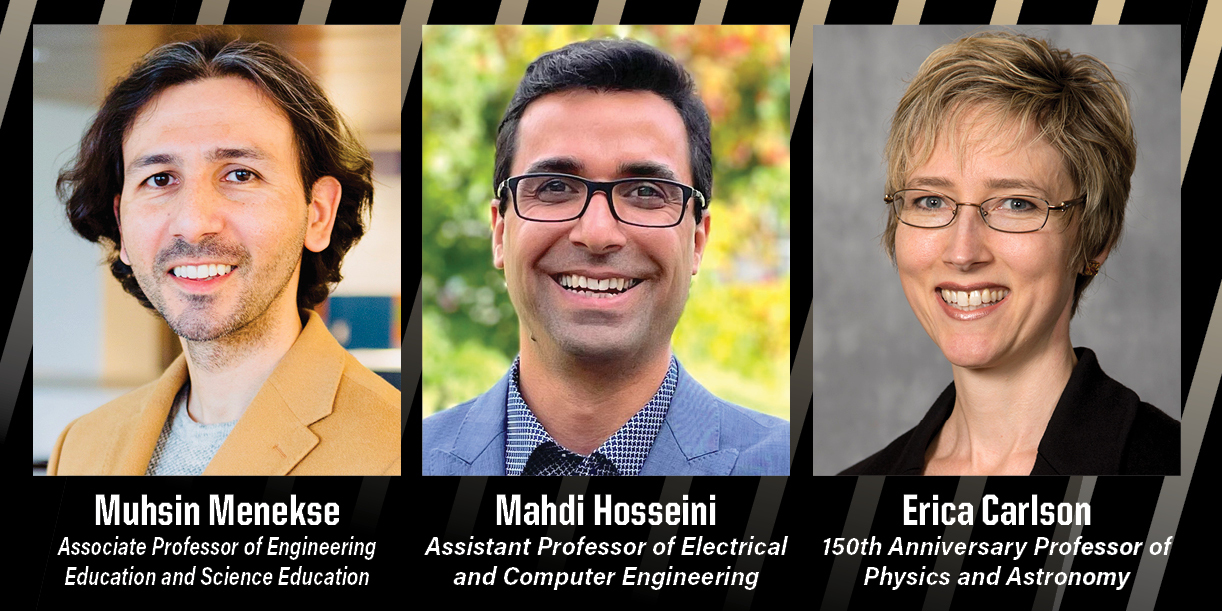U.S. Department of Defense awards $2.8M to Purdue University scientists for quantum education program
2021-10-19

The U.S. Department of Defense is awarding $2.8 million to a collaborative group of Purdue University professors in order to develop a quantum education program at Purdue. This grant is supported by the National Defense Education Program (NDEP) for Science, Technology, Engineering, and Mathematics (STEM) Education, Outreach, and Workforce Initiative Programs.
Professors involved in this grant are Mahdi Hosseini, Assistant Professor of Electrical and Computer Engineering and Courtesy in Physics; Muhsin Menekse, Associate Professor of Engineering Education and Science Education; and Erica Carlson, 150th Anniversary Professor of Physics and Astronomy. Purdue University is the primary recipient of the grant and the work will be done in collaboration with Microsoft Azure Quantum and Guided Particle Systems Inc. Other industry collaborators include IonQ, Entanglement Institute and Quantum Computing Inc.
This funding will be used to develop the Innovation in Quantum Pedagogy, Application and its Relation to Culture (IQ-PARC) project. This collaborative effort has a mission to flourish a community of intellectual engineers and scientists by providing the necessary curriculum and resources to advance quantum machines and systems education and research, leveraging peer learning templates, interactive environments and communities, multi-disciplinary networking, and other dynamic and fun teaching/learning approaches. They will work with companies like Microsoft that are leaders in the quantum space to develop state-of-the-art virtual and physical layers of future quantum systems, as part of making IQ-PARC’s goal a reality.
IQ-PARC seeks to address the gap in quantum education and workforce development. It will not only develop educational materials accessible to learners with different backgrounds and levels but also provide free access to a diverse set of quantum hardware for learners to interact with through Azure Quantum. They will achieve this goal by collaborating with industry forerunners in quantum technology including Microsoft and IonQ.
According to Menekse, the group “will collaborate with the Minority Engineering Program (MEP), the Women in Engineering Program (WIEP), and the Office of Future Engineers (OFE) at Purdue to reach current and future historically underserved college students and high school teachers and students to participate in quantum-themed activities, events, and workshops that will be organized as a part of this project." Inclusive programming and bringing together a set of partners who share this cultural priority is a cornerstone for the project.
Because of the diverse and collaborative backgrounds of the faculty involved as well as the strength of their corporate partners, this group represents expertise in the field of quantum engineering, physics and materials, research, and education.
“We are in a unique position to develop a ‘quantum interface’ that engineers and scientists can comfortably interact with,” says Hosseini. “For the first time, we will bring together students of different disciplines and provide them with necessary educational materials and free access to quantum hardware to interact with quantum technologies. Our efforts will be geared towards a ‘maker culture’ where students and professionals learn to abstract the hardware and innovate quantum interfaces.”
Corporate involvement with IQ-PARC will help guide and drive the success of this program. It will integrate quantum curriculum developed by the Microsoft team with Purdue’s Quantum courses and projects. Microsoft will also provide access to quantum hardware (such as IonQ) through Azure Quantum for students to interact and program quantum processors.
"We’re thrilled to extend our partnership with Purdue to embrace the development of quantum computing curriculum and templates, with the backdrop of our quantum hardware lab –Microsoft Quantum Lab West Lafayette—already situated at Purdue. The vision that the IQ-PARC team has around recreating for Quantum the grassroots energy and community which propelled the early days of computer programming is infectious,” notes Microsoft Azure Quantum General Manager, Krysta Svore.
This grant will span three years starting September 2021. Hosseini and Menekse acknowledge the internal funding by Purdue through "2018 EFC Quantum and Nano in Engineering” program that resulted in preliminary effort leading to this award.
Sources: Mahdi Hosseini, Muhsin Menekse, and Erica Carlson
Grant Number: HQ0034-21-1-0014
Writer: Cheryl Pierce